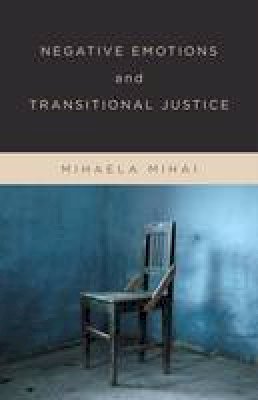
Stock image for illustration purposes only - book cover, edition or condition may vary.
Negative Emotions and Transitional Justice
Mihaela Mihai
€ 98.65
FREE Delivery in Ireland
Description for Negative Emotions and Transitional Justice
Hardback. Num Pages: 240 pages. BIC Classification: HPCF; HPS; JPB; LAQ. Category: (P) Professional & Vocational. Dimension: 229 x 152. Weight in Grams: 454.
Vehement resentment and indignation are pervasive in societies emerging from dictatorship or civil conflict. How can institutions channel these emotions without undermining the prospects for democracy? Emphasizing the need to recognize and constructively engage negative public emotions, Mihaela Mihai contributes theoretically and practically to the growing field of transitional justice. Drawing on an extensive philosophical literature and case studies of democratic transitions in South Africa, South America, and Eastern Europe, her book rescues negative emotions from their bad reputation and highlights the obstacles and the opportunities such emotions create for democracy. By valorizing negative emotions, either through the judicial review of transitional justice bills or the criminal trials of victimizers, institutions realize the value of respect and concern for all while contributing to a culture that is hospitable to democracy.
Product Details
Publisher
Columbia University Press
Format
Hardback
Publication date
2016
Condition
New
Number of Pages
240
Place of Publication
New York, United States
ISBN
9780231176507
SKU
V9780231176507
Shipping Time
Usually ships in 7 to 11 working days
Ref
99-1
About Mihaela Mihai
Mihaela Mihai is Senior Research Fellow in Politics and International Relations at the School of Social and Political Science, University of Edinburgh. She is the coeditor of On the Uses and Abuses of Political Apologies (2014) and Reclaiming Democracy: Judgment, Responsibility, and the Right to Politics (2015).
Reviews for Negative Emotions and Transitional Justice
Negative Emotions and Transitional Justice connects the threads between previously unrelated clusters of theory on justice, emotions, judgment, and democracy, bringing a new theoretical sophistication to the field of transitional justice studies.
Thomas Brudholm, University of Copenhagen Mihaela Mhiai skillfully maps the contours of the debate about the role domestic and international courts-and particularly judges-should or should not play in the development of democratic institutions in post-conflict societies. She argues convincingly that, if done correctly, courts can help balance the twin imperative of recognizing past harms and promoting a culture of respect for the rights of others. This is an important, thought-provoking book on an inordinately complex subject.
Eric Stover, University of California, Berkeley Mihai constructs an extraordinarily clear map of the boundaries of legitimate resentment and indignation against prior injustice and then shows how judicial decisions can be exemplary in demonstrating the right roles for these fitting but volatile emotions within a democratic order.
Margaret Urban Walker, Marquette University In the best tradition of political philosophy, Mihai stands on the shoulders of such giants as Hannah Arendt, Ronald Dworkin, and Judith Shklar to think through pressing contemporary normative and institutional questions about the nature, conditions, and practices of judgment as one of the pillars of democratic consolidation. Then, intelligently drawing on both new scholarship on the emotions and contemporary cases of transitional justice, she reaches beyond those thinkers to consider how democratizing societies can respond to and draw on the ethical judgments that such negative emotions carry, at the same time as performing and consolidating the principles of a society that treats all as equals. Tempering her vision of what might be possible with the realism of institutional, political, and cultural constraints, Mihai has achieved an original and important contribution to both theories and practices of transitional justice.
Danielle Celermajer, University of Sydney Mihai's meticulous argumentation style sets this book apart among accounts of emotional responses to past abuses. Perspectives on Politics
Thomas Brudholm, University of Copenhagen Mihaela Mhiai skillfully maps the contours of the debate about the role domestic and international courts-and particularly judges-should or should not play in the development of democratic institutions in post-conflict societies. She argues convincingly that, if done correctly, courts can help balance the twin imperative of recognizing past harms and promoting a culture of respect for the rights of others. This is an important, thought-provoking book on an inordinately complex subject.
Eric Stover, University of California, Berkeley Mihai constructs an extraordinarily clear map of the boundaries of legitimate resentment and indignation against prior injustice and then shows how judicial decisions can be exemplary in demonstrating the right roles for these fitting but volatile emotions within a democratic order.
Margaret Urban Walker, Marquette University In the best tradition of political philosophy, Mihai stands on the shoulders of such giants as Hannah Arendt, Ronald Dworkin, and Judith Shklar to think through pressing contemporary normative and institutional questions about the nature, conditions, and practices of judgment as one of the pillars of democratic consolidation. Then, intelligently drawing on both new scholarship on the emotions and contemporary cases of transitional justice, she reaches beyond those thinkers to consider how democratizing societies can respond to and draw on the ethical judgments that such negative emotions carry, at the same time as performing and consolidating the principles of a society that treats all as equals. Tempering her vision of what might be possible with the realism of institutional, political, and cultural constraints, Mihai has achieved an original and important contribution to both theories and practices of transitional justice.
Danielle Celermajer, University of Sydney Mihai's meticulous argumentation style sets this book apart among accounts of emotional responses to past abuses. Perspectives on Politics
